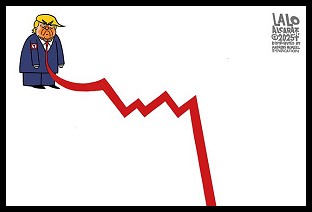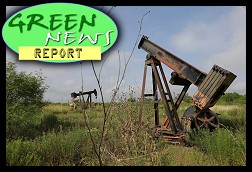 Are Republican voters 'warming up' to the science of climate change? A new study suggests as much, as CNN columnist and environmental reporter John D. Sutter details on today's BradCast. [See link to audio of today's show at end of article.]
Are Republican voters 'warming up' to the science of climate change? A new study suggests as much, as CNN columnist and environmental reporter John D. Sutter details on today's BradCast. [See link to audio of today's show at end of article.]
That news comes not a moment too soon, as record high temps in Alberta, Canada's tar sands oil region (ironically enough) sets the town of Fort McMurray on fire and sends some 80,000 residents scrambling for their lives amidst "apocalyptic" devastation. But are the attitudes of GOP voters on the planet's climate crisis changing quickly enough to prevent the worst effects of global warming, even as the Republican Party's apparent standard-bearer this year, Donald Trump, regards the science as little more than a massive "hoax"?
"I think there's a lot less division on this issue than gets made out in the media," Sutter tells me on today's show. "The skeptical voices, especially on the conservative side, are often heard the loudest. They come through the loudest on blogs. They have big media platforms and they get attention. But I don't think that's representative of what the actual American public thinks, and what the voters think. I do think there's a lot more room for agreement on climate change between conservatives and liberals than is often made out in the media."
In fact, as Sutter notes in his column on the new survey from the Yale and George Mason University's programs on on Climate Change Communication, "The percentage of conservative Republicans (not just Republicans but conservative Republicans) who believes climate change is happening has jumped 19 percentage points in the last two years, to 47%." He goes on to explain why that movement seems to be occurring now and to offer his explanation for the apparent contradiction between a huge majority of GOPers who support research into clean, renewable energy, even as so many of them remain climate crisis deniers.
"I think there's a disconnect between what people believe out there in reality and what politicians are willing to say. Because for them to propose regulating carbon dioxide as a pollutant, for example, they'd have to go up against some pretty monied special interests," he says. "There's a difference between real people and what politicians are willing to take up."
We also discuss Sutter's very encouraging recent reporting on the upcoming Washington state Initiative-732, which would put a price on carbon emissions --- "this often gets called the 'Holy Grail' of climate change policies," he says --- so that polluters will no longer be allowed to pollute for free. Just over the border in British Columbia, where a carbon tax was implemented in 2008, he explains, "the sky didn't fall" as predicted by fossil fuel industry opponents. In fact, "their economy has actually been out-pacing the rest of Canada" and "the level of support for the carbon tax has grown over time."
While Sutter's reporting on these issues at the CNN website is fantastic, I felt I still needed to ask him about the dearth of climate reporting on CNN's airwaves where, as a study last month found, viewers "see far more fossil fuel advertising than climate change reporting."
Also on today's BradCast: The U.S. Dept. of Justice notifies of North Carolina that their new law to discriminate against the LGBT community is a violation of the federal Civil Rights Act and may cost the state more than $2 billion in federal education funding; and Donald Trump, who will desperately need Hispanic voters if he hopes to win the Presidency this November, offers a remarkably offensive tweet on Cinco De Mayo. Because, of course he does.
(Snail mail support to "Brad Friedman, 7095 Hollywood Blvd., #594 Los Angeles, CA 90028" always welcome too!)
|


 Sunday 'Zero Day' Toons
Sunday 'Zero Day' Toons Soc. Sec. Expert Warns DOGE Hastening Collapse, Privati-zation: 'BradCast' 4/10/2025
Soc. Sec. Expert Warns DOGE Hastening Collapse, Privati-zation: 'BradCast' 4/10/2025 'Green News Report' 4/10/25
'Green News Report' 4/10/25
 Trump Blinks, Chaos Reigns, Markets Spike as Many Tariffs Remain Despite 90-Day 'Pause': 'BradCast' 4/9/25
Trump Blinks, Chaos Reigns, Markets Spike as Many Tariffs Remain Despite 90-Day 'Pause': 'BradCast' 4/9/25 SCOTUS Deportation Ruling Grimmer Than First Appears: 'BradCast' 4/8/25
SCOTUS Deportation Ruling Grimmer Than First Appears: 'BradCast' 4/8/25 'Green News Report' 4/8/25
'Green News Report' 4/8/25 Cliff Diving with Donald: 'BradCast' 4/7/25
Cliff Diving with Donald: 'BradCast' 4/7/25 Sunday 'Don't Look Down' Toons
Sunday 'Don't Look Down' Toons 'Green News Report' 4/3/25
'Green News Report' 4/3/25 'Mob Boss' Trump's Trade Sanctions Tank U.S., World Markets: 'BradCast' 4/3/25
'Mob Boss' Trump's Trade Sanctions Tank U.S., World Markets: 'BradCast' 4/3/25 Crawford Landslide in WI; Booker Makes History in U.S. Senate: 'BradCast' 4/2/25
Crawford Landslide in WI; Booker Makes History in U.S. Senate: 'BradCast' 4/2/25 Judge Ends Challenge to GA's Unverifiable, Insecure Vote System: 'BradCast' 4/1/25
Judge Ends Challenge to GA's Unverifiable, Insecure Vote System: 'BradCast' 4/1/25 Bad Court, Election News for Trump is Good News for U.S.: 'BradCast' 3/31
Bad Court, Election News for Trump is Good News for U.S.: 'BradCast' 3/31 Vets Push Back at Plan to Slash Health Care, 80K V.A. Jobs: 'BradCast' 3/27/25
Vets Push Back at Plan to Slash Health Care, 80K V.A. Jobs: 'BradCast' 3/27/25 Signal Scandal Worsens for Trump, GOP; Big Dem Election Wins in PA: 'BradCast' 3/26
Signal Scandal Worsens for Trump, GOP; Big Dem Election Wins in PA: 'BradCast' 3/26 'Emptywheel': Trump NatSec Team Should 'Resign in Disgrace': 'BradCast' 3/25/25
'Emptywheel': Trump NatSec Team Should 'Resign in Disgrace': 'BradCast' 3/25/25 USPS 'Belongs to the People, Not the Billionaires': 'BradCast' 3/24/25
USPS 'Belongs to the People, Not the Billionaires': 'BradCast' 3/24/25
 VA GOP VOTER REG FRAUDSTER OFF HOOK
VA GOP VOTER REG FRAUDSTER OFF HOOK Criminal GOP Voter Registration Fraud Probe Expanding in VA
Criminal GOP Voter Registration Fraud Probe Expanding in VA DOJ PROBE SOUGHT AFTER VA ARREST
DOJ PROBE SOUGHT AFTER VA ARREST Arrest in VA: GOP Voter Reg Scandal Widens
Arrest in VA: GOP Voter Reg Scandal Widens ALL TOGETHER: ROVE, SPROUL, KOCHS, RNC
ALL TOGETHER: ROVE, SPROUL, KOCHS, RNC LATimes: RNC's 'Fired' Sproul Working for Repubs in 'as Many as 30 States'
LATimes: RNC's 'Fired' Sproul Working for Repubs in 'as Many as 30 States' 'Fired' Sproul Group 'Cloned', Still Working for Republicans in At Least 10 States
'Fired' Sproul Group 'Cloned', Still Working for Republicans in At Least 10 States FINALLY: FOX ON GOP REG FRAUD SCANDAL
FINALLY: FOX ON GOP REG FRAUD SCANDAL COLORADO FOLLOWS FLORIDA WITH GOP CRIMINAL INVESTIGATION
COLORADO FOLLOWS FLORIDA WITH GOP CRIMINAL INVESTIGATION CRIMINAL PROBE LAUNCHED INTO GOP VOTER REGISTRATION FRAUD SCANDAL IN FL
CRIMINAL PROBE LAUNCHED INTO GOP VOTER REGISTRATION FRAUD SCANDAL IN FL Brad Breaks PA Photo ID & GOP Registration Fraud Scandal News on Hartmann TV
Brad Breaks PA Photo ID & GOP Registration Fraud Scandal News on Hartmann TV  CAUGHT ON TAPE: COORDINATED NATIONWIDE GOP VOTER REG SCAM
CAUGHT ON TAPE: COORDINATED NATIONWIDE GOP VOTER REG SCAM CRIMINAL ELECTION FRAUD COMPLAINT FILED AGAINST GOP 'FRAUD' FIRM
CRIMINAL ELECTION FRAUD COMPLAINT FILED AGAINST GOP 'FRAUD' FIRM RICK SCOTT GETS ROLLED IN GOP REGISTRATION FRAUD SCANDAL
RICK SCOTT GETS ROLLED IN GOP REGISTRATION FRAUD SCANDAL VIDEO: Brad Breaks GOP Reg Fraud Scandal on Hartmann TV
VIDEO: Brad Breaks GOP Reg Fraud Scandal on Hartmann TV RNC FIRES NATIONAL VOTER REGISTRATION FIRM FOR FRAUD
RNC FIRES NATIONAL VOTER REGISTRATION FIRM FOR FRAUD EXCLUSIVE: Intvw w/ FL Official Who First Discovered GOP Reg Fraud
EXCLUSIVE: Intvw w/ FL Official Who First Discovered GOP Reg Fraud GOP REGISTRATION FRAUD FOUND IN FL
GOP REGISTRATION FRAUD FOUND IN FL




























 On today's
On today's  On today's
On today's 


 Last year ended with a number of voter database breaches --- from the Sanders/Clinton/DNC database
Last year ended with a number of voter database breaches --- from the Sanders/Clinton/DNC database 
 It was a very busy live
It was a very busy live 

 On today's
On today's  Did someone or something flip election results last week in Ohio's statewide ballot initiative Issue 3 to legalize marijuana? We try to get to the bottom of that question --- and many others --- on today's
Did someone or something flip election results last week in Ohio's statewide ballot initiative Issue 3 to legalize marijuana? We try to get to the bottom of that question --- and many others --- on today's 













